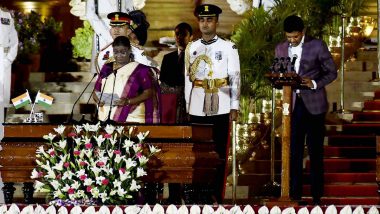Mumbai, June 11: Chandra Sekhar Pemmasani, the newly appointed Minister of State for Rural Development and Communications and the richest Lok Sabha MP, stood out during the recent oath-taking ceremony for India's government officials. While most leaders adhered to the traditional oath, pledging in the name of God to uphold the Constitution of India, Pemmasani took a different approach. As President Droupadi Murmu administered the oath of office and secrecy to Prime Minister Narendra Modi and 71 other ministers on June 9, Pemmasani's oath drew attention for its unique formulation.
Instead of invoking a higher power, he solemnly affirmed his commitment in English, stating, "I Dr Pemmasani Chandrashekhar do Solemnly affirm that...." This departure from the customary oath, where ministers typically invoke the name of God, highlights Pemmasani's distinct approach and perhaps reflects his personal beliefs or convictions. As a doctor by profession stepping into the realm of governance, his choice to affirm rather than swear may indicate a secular stance or a preference for a more inclusive oath-taking process. Who Is the Richest MP in India? ADR Says 504 Out of 543 Winning Candidates Are Millionaires, Check Names of Top 3 Wealthiest MPs.
Why Did Chandra Sekhar Pemmasani Omit Word 'God' in His Oath Taking?
In India, there are two prescribed methods for taking oaths, as outlined in the Constitution. The first involves swearing in the name of God, while the second allows for a solemn affirmation of integrity. The choice between the two is significant, particularly for those who do not adhere to religious beliefs, such as atheists, as reported by TV9. Unlike the traditional oath, Pemmasani chose to affirm his oath, stating, "I Dr Pemmasani Chandrashekhar do Solemnly affirm that." List of Ministers and Their Portfolios in India Free PDF Download Online: Modi Cabinet 2024 Announced With Portfolio Allocation, Know Who Gets What.
Chandra Sekhar Pemmasani Takes Oath
Dr Pemmasani Chandra Sekhar takes Oath of Office and Secrecy as Union Minister of State during the #SwearingInCeremony #OathCeremony #ShapathGrahan pic.twitter.com/Cw8b5GMRUp
— PIB India (@PIB_India) June 9, 2024
Pemmasani's decision to forgo the customary invocation of God during his oath-taking ceremony underscores the debate surrounding the format of oaths in the country. Under Article 75(1), individuals have the option to either swear in the name of God or solemnly affirm their allegiance to the Constitution of India. Pemmasani's decision to affirm rather than swear upon a deity signifies a departure from the religious connotations often associated with such ceremonies and indicates at his personal beliefs and convictions.
Other than the constitution, the provisions of the Oath Act-1969 also allows an individuals with options to wither opt to take an oath either in the name of God or by solemnly affirming to speak the truth. This choice extends to various contexts, including courtroom testimonies and the submission of affidavits.
(The above story first appeared on LatestLY on Jun 11, 2024 02:24 PM IST. For more news and updates on politics, world, sports, entertainment and lifestyle, log on to our website latestly.com).













 Quickly
Quickly


